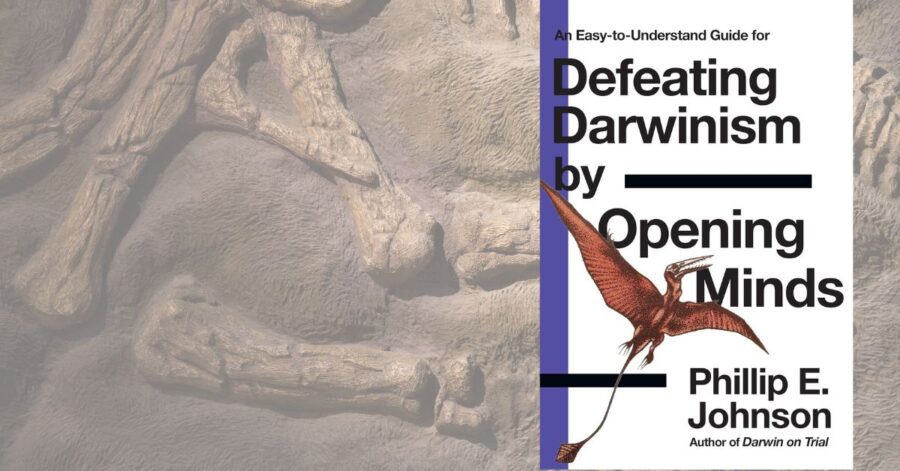One of the ideas behind Challenge B is introducing students to the relationship between science and faith, represented by the books The Soul of Science and Defeating Darwinism by Opening Minds. Unfortunately, Phillip Johnson’s Defeating Darwinism is often misunderstood by both his supporters and his critics. Therefore, I want to take this opportunity to explain what it is that Phillip Johnson is really after and why.
Taking Aim at the Secular Foundation: Materialism
First of all, despite the cover, you should know that Defeating Darwinism is not primarily about creation versus evolution per se. In fact, on the question of whether or not creatures came from the same or different ancestors is fairly irrelevant to Johnson. The book is not titled Defeating Evolution, but Defeating Darwinism, and the distinction is very important. Darwinism has a very specific meaning for modern evolutionary biology—basically, it means that (a) organisms evolve by mutations in their genes, (b) the mutations in their genes are primarily driven from accidental (not intentional) sources, and (c) the only thing directing the evolution of organisms is survival. More important than the mechanism, however, is the key fact that Darwinism does not allow any hint of purpose, planning, or intervention anywhere in the supposed evolutionary past. If you are curious what other types of evolution there might be, you might want to check out an earlier article of mine about the many theories of evolution.
The key philosophical driver of the Darwinian mindset is materialism—the idea that all that is real in nature is in the domain of physics. It may not be readily apparent why materialism and Darwinism go together. Darwinism is the attempt to explain life’s origins without going beyond material mechanism. That is why it supposes that all mutations are accidental—if they were purpose-driven, then that gives evidence that life was the result of purpose as much as mechanism. Unfortunately for them, while many mutations are certainly accidental, the mutations that are important for adaptation have almost all ended up being intentional to one degree or another. In other words, the organisms had built-in mechanisms to generate those types of adaptations. For those interested, I have created a short video on this phenomenon.
The Problem of Materialism to Christian Thought
Getting back to Johnson, his real target is materialism with Darwinism being the intellectual foundation for the rest of the enterprise. Materialism, however, is not just about Darwinism, origins, or biology. Materialism concerns people today. Do you believe that you have a soul? If you do, then you are not a materialist, for a soul is natural (every person in nature has one and people with souls interact with nature), but it is not material. Likewise, if you believe that you have a soul, you cannot be a Darwinist. Since Darwinism denies any purpose or supernatural involvement in the origin of organisms, even if you agreed generally with Darwin, if you believe that humans have souls, then somewhere in the origin of humans there had to be more than material mechanisms involved in evolution. Darwinism, either as a philosophy or as a scientific endeavor, cannot tolerate even one act of divine planning or intervention.
If one is a materialist who denies the soul, then that means that humans are really, in fact, just animals who think a lot of themselves. It also means that people are entirely locked into the results of their environment and biochemistry and cannot choose otherwise. It means that there is no such thing as free will, ethics, or morality, as these are all just accidental byproducts of our environment and mind. Johnson, as a lawyer, sees this worldview overflowing into other areas. His earlier book, Reason in the Balance, shows what is coming and what is already happening in education and law when materialism seeps its way into other parts of life. If materialism were true, it would be perfectly reasonable for us to embrace it in all parts of life. However, if humans do have souls, then it is unreasonable to embrace materialism even in biology.
Moving from Platitudes to an Active Faith
Johnson also creates a challenge to modern Christians. It is not good enough to say, “I disagree with materialism.” It is tiring to hear people continually capitulate to materialism in area after area and then top it off with “but I think that God was somehow involved.” If you believe that materialism is untrue, then, as Christians, we owe it to ourselves to integrate that idea into our ideas of where the world came from explicitly. That is, we should not brush God off to some esoteric and unknown place. Instead, we should look for how the reality of God and the reality of the soul impact both life today and the history of life until today. A Christian should therefore work to integrate his understanding of God with his understanding of the natural world and not separate them. You have a soul and it does things. God is active in the world and He does things. If you play the materialists’ game, you have, in a very practical sense, presumed God’s nonexistence. The materialists are fine if you believe in God the same way children believe in fairies—it is a fun exercise of the imagination and can help certain people who have trouble dealing with the world as it really is. But if you think that God, or even your soul, makes even the slightest difference in the world, then you cannot at the same time be a materialist or a Darwinist.
This is ultimately why modern academia has turned against Intelligent Design. It is not because the scientists believe in God, or because they believe, in some vague way, that God had something to do with the creation of the world. Materialists are perfectly happy for you to believe in vague ideas about God having something to do with everything. It is because Intelligent Design seeks to integrate ideas such as purpose and design into the modern view of nature with specificity that it has come under fire. The specific theories of Intelligent Design (Dembski’s specified complexity, Behe’s irreducible complexity, Dembski and Marks’ Active Information, and so on) may wind up being right or wrong. What makes them revolutionary is that they took the idea that purpose and design might be real and decided to make a research program to investigate the possibility. They crossed the line between vague notions of God’s action and really digging in to find out what God has been doing. Their ideas are not even that revolutionary—many of them being compatible with either direct creation or theistic evolution. What makes them different is that they are attempting to identify direct marks of purpose or creation, no matter when they may have arisen in the history of life.
The Slippery Slope that Starts with Darwinism
In the end, Phillip Johnson’s main concern is that modern academics (not just biology) have started taking materialism not as a point that requires proof, but as an article of faith. Obviously, there are certainly aspects of life that have material causes and effects. However, for Christians, material causes and effects are not the whole of reality. Capitulating in science—allowing the idea that reality is all physical—is merely practice for capitulation in other areas of life. Once you are convinced that God has no discernible influence in the events of today or the past, it will not take long to be convinced that God had no actual influence. From there, it is not a large leap to think that God has no right to lay upon us moral duties or even how we would know if He had done so. Phillip Johnson (and myself, as well) have seen this story happen many times.
So, in summary, what Phillip Johnson is concerned about is not your specific view of where or how life arose. Specific theories come and go throughout history. His concern is that you realize that materialism is not a conclusion based on evidence, but a worldview that people hold in spite of the evidence, and one that explicitly sets itself up against a God who is and has been active in the world. As Christians we should not settle with simple vague platitudes about God, but recognize that any purely material system or theory is really, in a very practical way, missing something. In the long run, if we choose to be academics, we should aim to search for what that is in our own field of study. If academics involves the search for truth, and God is true, we should find Him readily visible everywhere. Teaching our children to integrate God’s truths into science will help springboard them into integrating them into all other areas of life.
Postscript
In my own specialty—engineering—I have recently edited a volume dealing with the application of philosophy and theology to engineering. You can find the book on Amazon, titled Engineering and the Ultimate. If you have a background in engineering and are interested in philosophy and theology, you might enjoy it!




